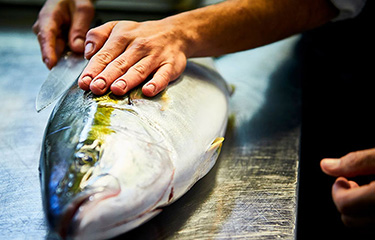UK-Australia FTA could prove a boon for high-end seafood producers

Expected to enter into force in a matter of weeks, a free trade agreement (FTA) between the United Kingdom and Australia will soon provide businesses and consumers in both countries with access to more competitively-priced products.
Signed in December 2021, six months after an “agreement in principle” was established, the FTA was the first major post-Brexit trade deal to be negotiated by the United Kingdom. Changes in the U.K. government have slowed ratification, but it’s widely anticipated the agreement will officially come into effect in either April or May 2023, unlocking several billions of dollars of additional commerce.
It’s already being welcomed on both sides. For the United Kingdom, it’s envisaged the removal of tariffs will make Australia a more-attractive destination for such products as British-made whisky and gin – two of the country’s leading exports, while for Australia, with the country being a large exporter of agricultural goods, the immediate elimination of tariffs on 99 percent of products (including all fruits, vegetables, and wine) will undoubtedly make the U.K. market more appealing.
However, the agreement is unlikely to lead to large volumes of British seafood making the journey down under. Even farmed salmon – the U.K.’s top food export – will have limited opportunities in the market due to Australia’s own fast-expanding salmon sector. But it could be a very different proposition for Australia’s seafood industry. The immediate elimination of tariffs on all Australian finfish and the 12 percent tariff on fresh and frozen rock lobster is expected to bring significant export opportunities. Furthermore, any remaining seafood tariffs are to be eliminated over three years.
While the notoriously price-sensitive U.K. market will remain not an option for those Australian seafoods considered too niche, lacking in a U.K. profile, or where production costs are too high, for others, the door will be opened much wider.
Australian seafood companies have welcomed the opportunity to supply the U.K. market’s 65 million-plus consumers, according to Seafood Industry Australia (SIA).
SIA CEO Veronica Papacosta said industry has put a lot of hard work into diversifying its markets to ensure it has a resilient export strategy.
“The U.K. deal will create new and needed opportunities for Australia’s seafood producers in a high-value market,” she said.
A good example is the yellowtail kingfish farmed by Clean Seas Sustainable Seafood in South Australia, which is already Australia’s largest seafood export to the European Union by value.
“Our Spencer Gulf Kingfish is already used by many of the leading sushi outlets in the U.K. But thanks to the FTA, the British consumer will now get much wider access to our fish,” Clean Seas Chief Commercial Officer Antoine Huon said.
Tewkesbury, U.K.-based frozen seafood importer Southern Aqua Seafoods, which specializes in premium seafood products from the antipodes, expects the new agreement to underpin a high-end seafood trade that has flourished before the FTA, with a good number of Australian products and producers already making their mark in the United Kingdom, according to David Price, the company’s commercial director.
For example, the highly-prized Western rock lobster could also “and at long last” build a presence in the United Kingdom, he said.
“This was the first fishery in the world to achieve Marine Stewardship Council (MSC) certification – something the U.K. market values, but it hasn’t featured because the duties made it too expensive. It definitely has a place on British menus when things level out,” Price told SeafoodSource.
The new agreement could also make Australian prawns a viable commercial proposition for U.K. retail outlets, according to Austral Fisheries, a vertically integrated seafood company based in Mount Hawthorn, Australia-based Austral Fisheries, which catches Patagonian toothfish in the Southern Ocean and prawns and tropical snapper species in Australia’s northern prawn and Timor Reef fisheries.
“We have always had great interest and untapped demand from British supermarkets and restaurants in our delicious wild-caught Australian prawn but have always been hampered by the prohibitive import duties, to the advantage of farmed shrimp from Asia. So the imminent removal of these duties is a wonderful opportunity to give access to this product to the British consumer,” Austral Fisheries Marketing Manager Dylan Skinn said.
Another established product that could benefit is Austral’s branded Glacier 51 Toothfish, a fish that has been catching the imagination of top chefs throughout the world for a decade but is yet to debut in British restaurants, Skinn said.
Newer branded Australian products are also expected to ...
Photo courtesy of Clean Seas Sustainable Seafood





Share